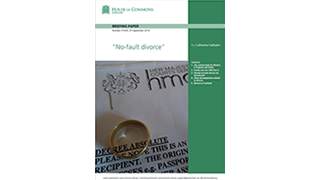Briefing paper on 'no-fault' divorce published by House of Commons

The House of Commons has published a briefing paper, examining some of the arguments for and against the introduction of "no-fault divorce".
It was written by a researcher at the Commons Library – a government service that provides impartial information and research for Members of Parliament and their staff.
The paper argues that advocates of 'no-fault' divorce believe a change in law will reduce conflict raised by allegations of fault. It adds the claim that, in some cases, the assertion of fault is considered to be "charade".
Meanwhile, those campaigning against the introduction say the institution of marriage should be supported, highlighting the negative impact of family breakdown.
Current law
Under current divorce law in England and Wales, a person has to demonstrate that a marriage has broken down irretrievably.
It can have broken down for one of five reasons - adultery, unreasonable behaviour, desertion after two years ("fault-based" reasons), two years' separation with consent or five years' separation without consent ("separation-based" reasons).
The latest figures, from the Office of National Statistics, show that 62% of divorces in 2012 were "fault-based".
If the grounds for divorce are agreed, and the court sees no reason why there cannot be a divorce, a decree nisi document is drawn up. A decree absolute is then issued, legally ending the marriage.
2015 Private Member's Bill
In 2015, Richard Bacon MP introduced a Private Members' Bill aimed at allowing 'no-fault' divorce, saying that it would remove the need for couples to "throw mud at each other."
The plan was strongly challenged by Sir Edward Leigh MP who said that while introducing 'no-fault' divorce might appear a "common-sense thing to do," it would have a "large, widespread and demonstrable effect" on society.
He went on to warn that the introduction of 'no-fault' divorce in Canada increased the numbers of divorce six-fold, in just two years, after a century of relatively stable divorce rates.
Sir Edward - who has a track record of speaking in support of marriage and family - added that while introducing 'no-fault' divorce might appear a "common-sense thing to do," it would have a "large, widespread and demonstrable effect" on society.
The Bill did not make further progress due to lack of time in the 2015-16 Parliamentary calendar.
'Encourage, support and equip people for marriage'
Sir Edward's concerns were echoed by Andrea Williams, chief executive of Christian Concern, who said:
"Divorce is obviously painful, but the right response is not to diminish the significance of break-up. Rather, we should work harder to encourage, support and equip people to thrive within marriage.
"As the evidence repeatedly shows, marriage provides the best outcomes for adults, children and the wider community. This is not surprising given that God designed it."
'Reformed' divorce law
A new research project, funded by the Nuffield foundation, is currently exploring how the current laws on divorce and civil partnership dissolution operate in practice.
The aim of the project, which runs from October 2015 to September 2017, is to inform debate about whether and how the law might be “reformed”.
Cost of family breakdown
A number of recent studies highlight the devastating societal impacts of family breakdown.
The Relationships Foundation, for example, estimated that family breakdown cost the public purse £47 billion in 2015, the equivalent of £1,546 for every UK taxpayer.
Research carried out last year, by Resolution - the family lawyers' association - indicated that divorce and family breakdown adversely affect young people, making them more likely to experiment with drugs and alcohol and perform worse in GCSE and A-Level exams.
Marriage, however, has been proven to benefit society significantly, providing emotional and financial stability.
According to recent research by the Marriage Foundation: "Couples who marry before their first child have a 76% chance of staying together, as opposed to 31% of cohabiting couples."
Studies also showed that "staying together was ... found to have the same positive impact on subsequent income as having a degree."
Digital divorce
On 26 February 2016, in a speech to the Family Law Bar Association, Sir James Munby, President of the Family Division, revealed his plans for divorce proceedings to take place online.
He said the click-for-divorce process was "a vision not of some distant future but of what has to be".
The full-scale digitisation of the legal process governing divorce is expected to start in early 2017.
'Greatest threat to the family in our times'
Writing for Crisis Magazine in 2005, Stephen Baskerville commented that in reality 'no-fault' divorce laws don't really remove fault from the context of divorce, but "create unilateral and involuntary divorce, so that one spouse may end a marriage without any agreement or fault by the other."
Responding to Baskerville, Dr Al Mohler, President of The Southern Baptist Theological Seminary, states: "divorce is the greatest threat to the family in our times... we cannot expect this society to take us seriously as defenders of marriage if we are not the enemies of divorce".
He adds:
"Divorce has become so common that many Christian leaders fear creating a tidal wave of offense and resentment if they deal honestly with the issue–or address it at all. Accordingly, successive generations of Christians have now grown to adulthood believing that divorce is simply a lifestyle option.
"Where is the recognition that divorce is an affront to the glory of God and a sin that is expressly described in the Bible as an evil that God hates?"
